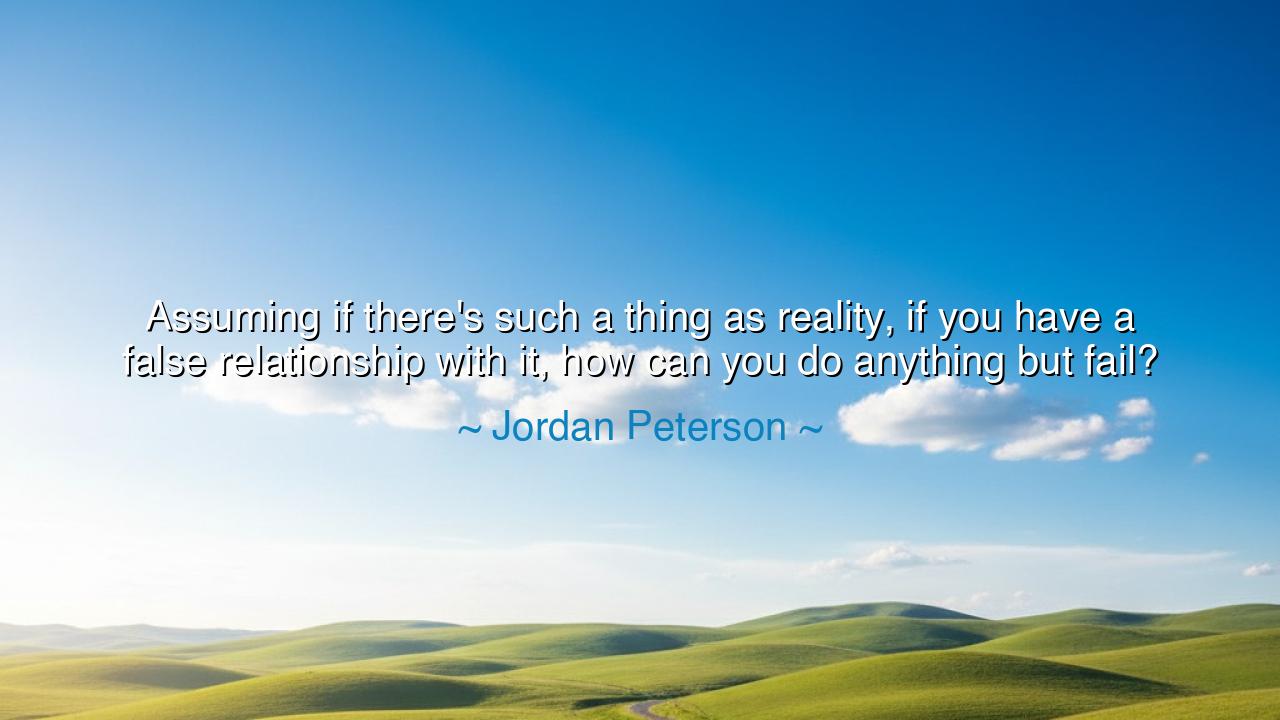
Assuming if there's such a thing as reality, if you have a false
Assuming if there's such a thing as reality, if you have a false relationship with it, how can you do anything but fail?






The words of Jordan Peterson—“Assuming if there’s such a thing as reality, if you have a false relationship with it, how can you do anything but fail”—strike with the austerity of a philosopher who demands alignment between thought and truth. They remind us that to live in illusions, however comforting, is to build one’s house on sand. The foundation of all strength, all achievement, is harmony with reality, for denial of it leads only to collapse.
The ancients knew this law of existence well. Heraclitus spoke of the Logos, the eternal order of things; to live in ignorance of it was to walk blind into ruin. Likewise, the Stoics warned that man must see the world as it is, not as he wishes it to be, if he is to live with wisdom. Peterson echoes this timeless truth: when one’s relationship to reality is false, all actions spring from error, and the harvest is inevitably failure.
This truth is both humbling and heroic. Humbling, for it strips away the pride that blinds us into thinking we may bend the world to our desires. Heroic, for it challenges us to courage—the courage to see clearly, to bear the weight of truth, even when it is harsh. The false relationship may be easier, filled with soothing illusions, but it leads the soul astray; the true one is harder, yet it alone can guide us to victory.
Peterson’s words are also a warning to generations: beware of comforting lies. Whether in politics, love, or the self, to cling to illusions is to craft one’s own downfall. Reality does not yield to wishful thinking; it demands respect, patience, and alignment. Only by bowing to its laws can man rise to his fullest stature.
So let this teaching endure: cultivate a true relationship with reality, however bitter, and you shall find strength. Flee into falsehood, and you are already undone. For as the ancients knew, and as Peterson reminds us, truth is not only a guide but a judge—and those who walk against it will always fail, while those who walk with it may yet endure and triumph.






KLKhanh Ly
Jordan Peterson’s perspective on reality and failure challenges us to confront our assumptions. If we have a false relationship with reality, it’s easy to see why we might fail. But does that mean that all failure is a result of this false relationship, or could there be other factors at play? What about the role of external circumstances and unforeseen events—can they still cause failure, even if our relationship with reality is accurate?
NLThang Nguyen Le
Peterson’s quote suggests that without a true understanding of reality, we are doomed to failure. But I wonder, what does failure really mean in this context? Is it about achieving specific goals, or is failure more about not being aligned with reality’s deeper truths? How can we develop the wisdom to recognize when we have a false relationship with reality, and how do we correct it to ensure we don't fail?
TLTrang Lam
Jordan Peterson’s comment on reality and failure speaks to the importance of self-awareness and understanding. But it also leaves me wondering, can we ever have a truly accurate relationship with reality? Does the very nature of human perception mean that we will always have a distorted view of reality in some way? How do we approach life when there’s so much uncertainty about what’s truly real, and how can we learn to navigate that uncertainty without failing?
AHBui Thi Anh Hong
This quote by Peterson makes me think about how our perceptions and beliefs shape our actions. If we are living with a false sense of reality, it can lead us to make choices that are out of alignment with the truth. But is reality always as clear as we think, or is it subjective to some extent? How do we determine what is real versus what we wish to be true, and how does that affect our success in life?
::///
Peterson’s reflection on the importance of having a true relationship with reality is thought-provoking. But what does it mean to have a 'false relationship' with reality? Is it about living in denial, or is it simply about having misguided expectations? Does our failure come from being out of touch with reality, or from not adapting when we face challenges? How do we strike the balance between maintaining hope and accepting harsh truths?